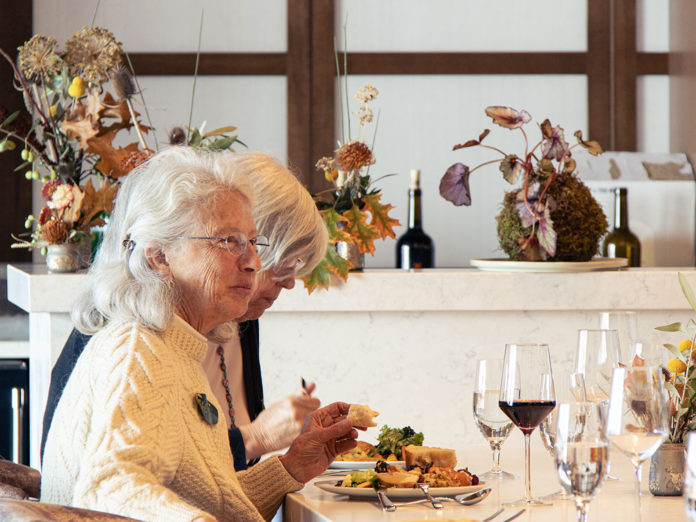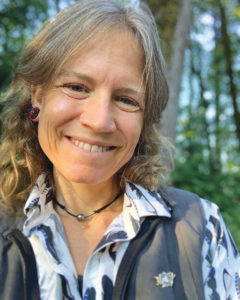
By Weeklys Staff
In Wine Country, we’re used to the notion of aging—especially when it comes to wine and cheese. But when it comes to our lives, will they also improve with age? The jury is still out, and hopefully on a prolonged recess.
Erin Partridge has enough letters after her name that it looks like someone spilled alphabet soup on her business card: Ph.D. and ATR-BC, which means she’s a board-certified art therapist. But beyond her clinical experience, Partridge is also a key member of Enso Village, the senior living community recently opened in Healdsburg.
When asked about how the different generations embrace aging, she shut it down with both eloquence and wisdom.

“Anti-ageism researchers and advocates suggest spending less time focusing on generational labels and more time focusing on the things that connect us. Which is a positive change!” says Partridge. She’s worked in community, pediatric, forensic and geriatric settings and has published in the areas of art therapy, arts access, eldercare, gender, research methods, professional development and technology.
“Our collective experiences over the past few years highlight the harm possible from loneliness and isolation,” she adds.
“With regard to fear and hope, this is another area of interesting research—a negative view of aging (in general, or about oneself) can create poor health outcomes,” Partridge says. “As we see more examples of supportive, intergenerational communities, we will hopefully see a reduction in the negative views about aging.”
To that end—literally—there are benefits to be experienced while traipsing to the inevitable.
“One of the biggest benefits we saw in a community project about growing older, and that I have since heard echoed over and over in practices, is the perspective and increased self-confidence that comes with more life experience. One way we might be able to better grow older is to embrace our curiosity. This was recently exemplified by a resident at Enso Village who described herself as ‘all in’ for new experiences,” Partridge says.
Boomers Age Up
Partridge’s self-created title at Enso Village is “Head of Inspirement.” She explains it this way: “One of our residents stated that they don’t want to think of it as going into retirement, but a different way of being! Inspirement is about creating opportunities for learning, curiosity and connection. It is about continuing lifelong practices and finding new interests.”
Boomers in particular may need some “inspirement,” as 2024 marks the year the youngest among them turn 60.
“Born between 1946 to 1964, boomers are age 60 to 78,” reminds Mindy Solkin, the founder and creator of BB Babes, the fashion, fitness and health network for baby boomer women. To that end, Solkin is marking 2024 as “The Year of the Baby Boomer Woman.”
“Hitting age 60 is a milestone, somewhere between thinking about retiring, already retired or never going to retire,” she says.
“Boomers are re-inventing themselves and giving back, helping themselves while they help others,” says Solkin. “I went from coaching 30-year-old runners to creating a new venture focused on bringing my five decades of knowledge and experience to boomer women who want to look and feel their best at every age.”
Susan Williams, RN, a senior health expert with extensive experience in gerontology and senior care, concurs.
“Having redefined every life stage they’ve passed through, boomers are now redefining retirement, often seeking active, purposeful post-retirement lives,” says Williams, who is also a senior health contributor at Retirement Being, specializing in aging demographics and eldercare.
She adds, “They are not just settling into traditional retirement but are exploring new careers, engaging in volunteer work and even starting businesses. Boomers view retirement as a new phase of opportunity and adventure, often focusing on personal growth, lifelong learning and community involvement.”
Conversely, on the other end of the spectrum, Williams perceives millennials’ approach to aging as a “mix of apprehension and proactive planning.”
“They are more inclined to focus on wellness and preventive care from a younger age, showing a keen interest in holistic health approaches and technological innovations in healthcare. This generation is also more vocal about mental health, seeking to destigmatize related issues and incorporate mental wellness into their aging process,” she says.
Common fears across these generations, according to Williams, include health decline, financial insecurity and the loss of independence. Millennials worry about the long-term impacts of their lifestyle choices and environmental factors—whereas boomers and Gen Xers often fear age-related diseases and losing the ability to care for themselves.
The Upside
“Conversely, their hopes are centered around healthy aging, maintaining independence and having fulfilling, active lives even in later years,” Williams says. “Growing older brings many benefits, such as increased wisdom, deeper self-understanding and a clearer sense of what’s truly important in life. Seniors frequently report higher levels of happiness and satisfaction compared to younger individuals.”
Williams reminds us that to age better we should all embrace a healthy lifestyle, maintain social connections and engage in lifelong learning.
“It’s also important to plan for the future, including financial planning, health care and living arrangements, to ensure a comfortable and fulfilling older age,” she adds.
Mainstream culture may be catching up to generational tastes. As Mary Westheimer, author of the upcoming book What Nobody Tells You About Getting Older, points out, “We finally like the music in the grocery store.”









I am an American male 72 years of age. The life expectancy of males in the USA is now 73.2 years (and declining). 2024 may well be the “Year of the Baby Boomer Woman” but many of us Boomer Men will be dead.